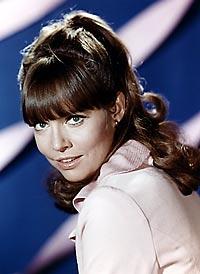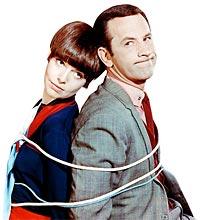Classic "Get Smart" on DVD: Q&A with Barbara Feldon, Agent 99

Just as documents from the Cold War are gradually being declassified, one of the greatest comedy series of the era is finally coming in from the cold. And would you believe (as the show's catch phrase went) all five seasons in one box? But "Get Smart: The Complete Collection" (Time Life, $199.96) is only available at www.getsmartondvd.com until next fall, when it infiltrates retail outlets.
Barbara Feldon became a pop-culture icon playing the lovely and capable 99 opposite the late Don Adams' bumbling Agent 86, aka Maxwell Smart. When the series ended in 1970, she went on to make a number of TV movies, but nothing had the staying power of the work she did for "Get Smart" creators Mel Brooks and Buck Henry. Now 74, Feldon appeared composed by phone from her New York City home as I debriefed her.
Q: In the 1965 pilot, Max's shoe phone goes off in a theater. How did you people know?!
A: Isn't that amazing? It really is, I mean it was so prescient of them to — well they're artists, Buck and Mel. Do you think people do pick up on things that are about to happen? I don't know.
But actually I was once invited to the CIA headquarters in Langley [Va.], and they were having exhibits of real spy paraphernalia and movie and TV spy paraphernalia, and they told me that during the '60s they would watch those shows, and they would try to make those things happen. Like the necktie that recorded, or the fax necktie or whatever. So it was life imitating art.
Q: "Get Smart" took place in the Cold War. How do you think Max would deal with the war on terror? Surely the Cones of Silence would be employed somehow.
A: Oh wow. Do you know Tom Lehrer — the very anti-war songs he wrote? [They were] about the atom bomb and things like that, and they were very, very clever and very funny. And years later they asked why he stopped writing that kind of satirical material, and he said "Because life got too serious." And I think there are probably some things you can't satirize. But certainly CONTROL headquarters was out there getting the bad guys and the bad guys were terrorists in the sense that they were going to blow up the United States and do all these nasty things. So I suppose they did deal with it.
Q: In the women's lib era, 99 was the opposite of what they say about James Bond: Women wanted to be you and men wanted to be with you.
A: (Laughing.) "Get Smart" was just on the brink of the women's movement, and it was before some of the more extreme feminists got extremely confrontational. It was kind of an amalgam of the 1950s and what was coming for women in terms of their empowerment. So 99 retained the deference that women had toward men — at least publicly had toward men. Although as we now know, they were seething with all kinds of resentment at their roles in society and in the marketplace — the marketplace meaning economically.
But at this moment in history when "Get Smart" happened, there was not really a tug of war between men and women, and I think it was kind of a nice entry level feminism that 99 expressed, which was deference to the men and appreciation for the sensitivity of men, because she would never lord her intelligence or her acumen over Max. It was a combination of that and also her self-assertiveness in terms of not disguising what she could really do and solve. Although she sugar-coated it a bit.
Q: According to IMDb — and notice how I'm putting responsibility for this on someone else — your character was originally called "69" instead of 99. Is this true?
A: Nooooo! (Laughs.) Oh that is just terrible! No. Buck Henry was going to call the character "100." Because she was 100 percent, but then he said that didn't sound like a girl's number, so he called her 99. And 100 is a hard thing to say; 99 just rolls off the tongue very conveniently. So that is the official origin of the name.
Q: Adams was a real he-man — the only survivor of his Marine platoon at Guadalcanal and also a drill instructor.
A: He wrote an autobiography that he was working on, I guess, when he died, and he gave it to me to read, and it was wonderful. And all his war experiences were in there. But certainly when I was working with him I was not aware of that. And Don almost died of some kind of fever, and in his book he said they put him over on the side waiting for him to die with the dying, and they didn't expect him to live, and he did live.
Q: You're quite tall and he was not. How did that work?
A: Well to the extent that it worked, it worked because I always say that I'm the only actress with calluses on her ankles. I twisted my foot underneath me. I worked in my stocking feet, and I had a way of slumping. And that's one reason I don't like to watch the shows, because if I'm in one of those endless scenes where I'm doing nothing but being sort of wallpaper in the scene, I'm trying to look short. But at that time it was more important for a woman to be shorter than a man than it became today. Well, you tell me, you're a man: Does it matter that much?
Q: I like tall women. What kind of relationship did you have with Don?
A: Max and 99 had a terrific relationship. And it developed as time went on, they got more and more comfortable with each other. ... Personally, Don was very involved in the show, in the writing, in terms of polishing that, even on the set, and in many other ways, he was involved on the set all the time. I was not. I was just doing my bit. Consequently he had no time to socialize. So we never had a social life outside of 99 and Max — until about five years ago, and suddenly we had a series of appearances that we did together, and found that when we saw each other again there was just this wave of affection that had been there all along, even though we hadn't been in touch in decades.
Q: Why weren't you in "Nude Bomb" — the 1980 Maxwell Smart movie?
A: They didn't ask me, frankly. I think when they conceived of the movie they were thinking of a James Bond kind of thing and they wanted like nubile ... twinkies? What did Max need with a wife? I'm only surmising that. Everybody's been too embarrassed over the years to even discuss it with me. Not that I cared at all because it got just such terrible reviews that I was sort of fortunate I dodged that bullet.
Q: I'm so glad to be the one to bring that up, then.
A: Oh, I don't care at all. When "Get Smart" was over I was really eager to do other kinds of roles. So to do a "Get Smart" movie at that point would not be at the top of my list, so when it happened without me I didn't even bat an eyelash.
Q: You wrote a self-help book in 2003 called "Living Alone and Loving It."
A: Yeah, I didn't mean it to be a self-help book, but I'm sort of happy it is. I love writing, and I'd been talking to people who live by themselves and feel they're living a half life until they meet the mate and have a real life. And I felt what a shame because there are two ways to be really happy and one is to have a great mate and the other is to live by yourself and not have a great mate but to have great friends and interests and creative time. So I decided to write this little book of essays on how I worked through the issues of living alone. And I used the "Get Smart" "and loving it" thing in the title; I don't know if anyone gets that or not.
Mark Rahner: 206-464-8259 or mrahner@seattletimes.com
